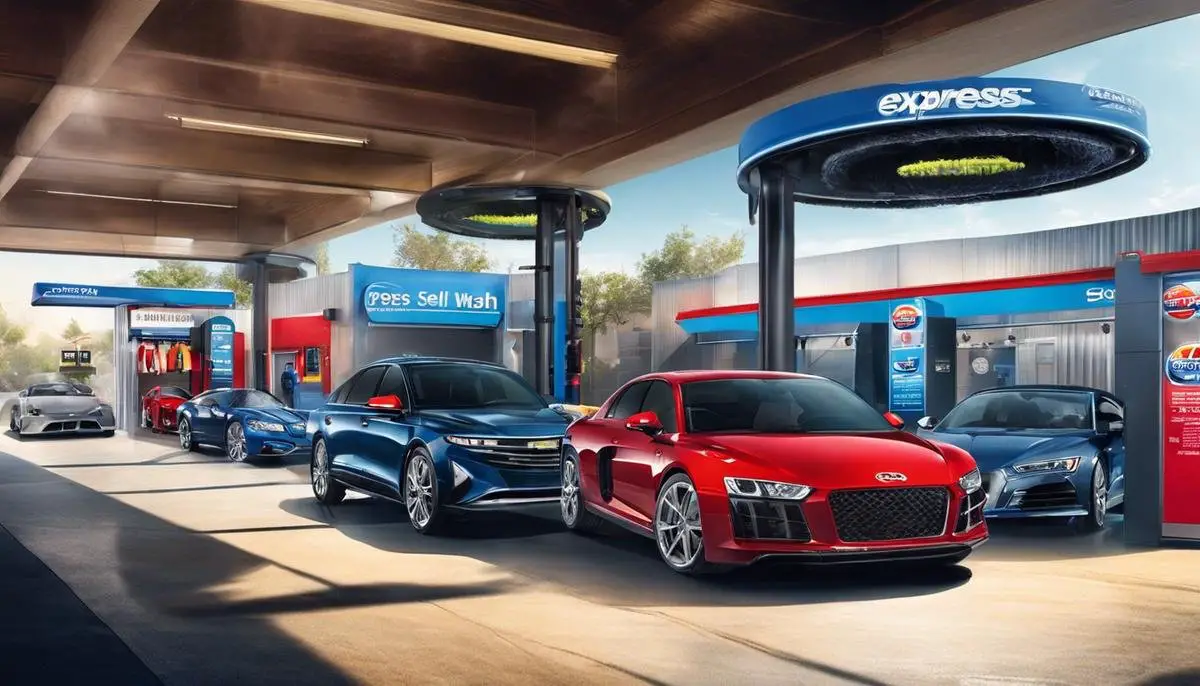
In the intricate tapestry of American commerce, the decision of car dealerships to close their doors on Sundays stands as a curious anomaly in a culture accustomed to 24/7 retail availability. This practice, rooted in the historic framework of Blue Laws designed to sanctify the Sabbath, has withstood the test of time, often baffling consumers and industry outsiders. As we journey through the annals of the automotive industry, we unveil the multifaceted reasons behind this enduring tradition, delving into the Blue Laws' inception and their persistent influence on the dance of commerce and leisure that defines American Sundays. Examining our nation's varied legal canvas, we will uncover not only the patchwork of mandates that enforce these closures but also the compelling economic logic that might justify this day of rest for car dealerships. Indeed, to fully appreciate this commercial peculiarity, we must look beyond the surface into its broader economic and cultural ramifications.
Historical Context
The Historical Gear Shift: Why Car Dealerships Close on Sundays
The traditional closure of car dealerships on Sundays is a fascinating interplay of history, culture, and legislation. It's a relic from a bygone era that speaks volumes about past values and continues to impact the automotive industry today.
It's no secret that the American marketplace thrives on accessibility and convenience. Yet, despite the round-the-clock consumer culture that's taken hold in most retail sectors, car dealerships remain notably parked in the past with Sunday closures – a day traditionally reserved for rest and worship.
This practice finds its roots in the blue laws, an archaic set of regulations birthed in the early American colonies intended to enforce religious standards, particularly for observing the Sabbath day of rest. Although the original blue laws encompassed a myriad of prohibitions, many have been repealed or aren't enforced, except for one notable exception: car sales.
As the automotive industry revved up in the 20th century, dealer associations and lawmakers drove home legislation to keep dealerships closed on Sundays. The rationale? A combination of respect for religious observance, ensuring a day off for sales staff, and economic strategy. By synchronizing days off across the industry, no dealership would gain the competitive advantage of being the sole open provider on Sundays – creating a level playing field that's persisted for decades.
Some may view this as a hangover from a puritanical past, yet there is a strategic brilliance in having a uniform day off, allowing for a recalibration of marketing strategies, inventory management, and employee well-being – factors crucial to the overall effectiveness and longevity of the business.
Moreover, the enforced downtime can spark innovation. As dealerships compete for customers on the other six days of the week, they're driven to provide exceptional service and expediency to sway consumers their way. It's a lesson in scarcity marketing: limit the time your product is available and watch demand soar.
Tantalizingly, however, the tides of change gently lap at the industry's shores. Some states have challenged the status quo, allowing dealerships to keep their doors open on Sundays. The results are mixed, reflecting both the resilience of tradition and changing consumer demands.
As consumer behavior continues to evolve with the internet age bringing the likes of car vending machines and online dealerships where Sundays don't apply, the industry's adherence to Sunday closure faces a crossroads. Yet, at the crux of it all, this norm serves as a testament to the enduring influence that history holds over modern commerce.
Whether it's the lessons learned from the past or the pulse of emerging consumer trends, savvy business minds recognize that understanding the underpinnings of such traditions is vital in charting a course for commercial success in any industry. In the end, whether it's the power of history or the allure of innovation, the Sunday closure of car dealerships remains a curious peculiarity in the bustling marketplace that is America's business landscape.
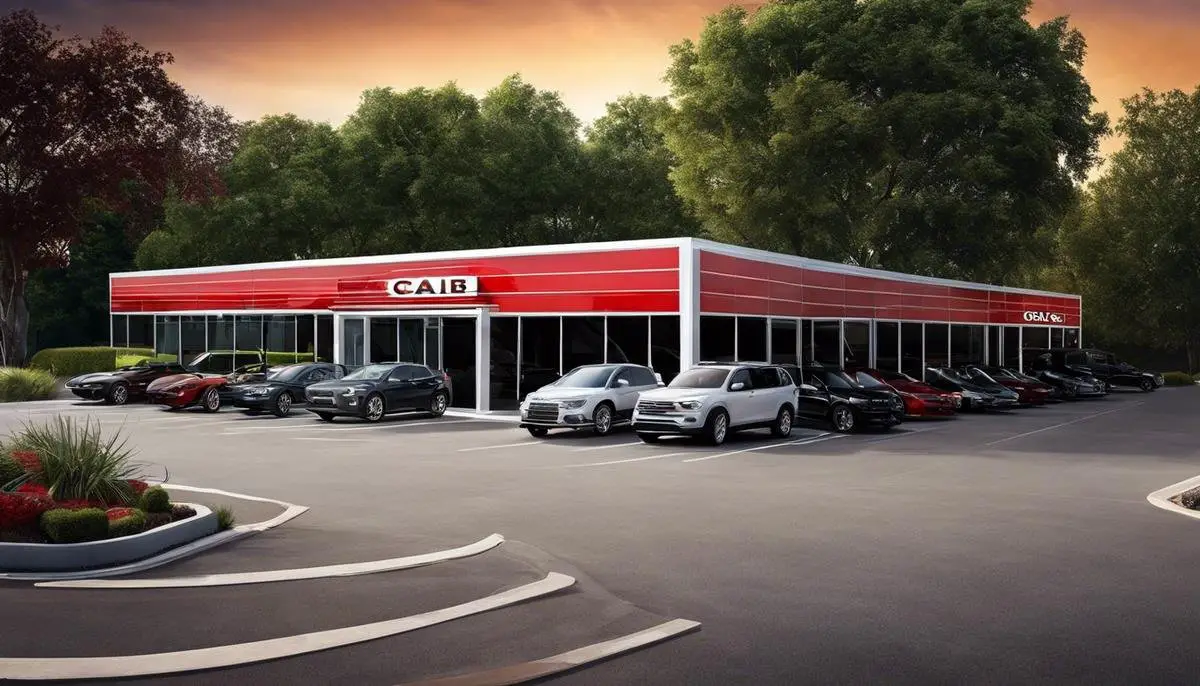
Legal and Regulatory Landscape
Title: Navigating Blue Laws: Legal Restrictions on Sunday Operations for Car Dealerships
As astute entrepreneurs and industry leaders, one must constantly study the myriad of laws and regulations that govern the operational frameworks within which business is conducted. A peculiar facet in the United States is the legal restrictions known as "Blue Laws" that limit car dealership operations on Sundays. These laws, while archaic to some, still hold sway in various states, mandating non-operation for auto dealers and shaping the weekly rhythm of the automotive market.
Diving deeper into the legal frameworks, these statutes are remnants of puritanical legislation aimed at preserving Sundays for worship and rest. However, in the context of car dealerships, Blue Laws serve a dual purpose. First, they provide a respite for employees in an industry famous for its demanding hours. Second, they create a predictable landscape for both dealers and consumers, fostering a stable purchasing environment free from the frenzy common to other retail sectors.
States like Colorado, Illinois, and Missouri have statutes in place that restrict car sales on Sundays, entrenching the day as one set apart from commerce. The wisdom here is not merely reflective of tradition but is the acknowledgement of the unique nature of purchasing vehicles—as considered and significant financial decisions for consumers.
Moreover, such restrictions have led to innovative business practices. With one less operational day, dealerships have fine-tuned their sales approaches and customer engagement methods during the rest of the week. It's also pragmatic to note that these legislations aid in curbing non-stop competitive pressure, allowing for a recalibration of strategies and safeguarding against burnout in an industry prone to high employee turnover.
While some argue that these laws are antithetical to a free market, proponents assert the importance of a collective pause that fosters community and personal well-being. However, with the relentless pace of digital transformation, online car browsing and preliminary transaction processes continue to blur these once-clear boundaries. E-commerce and digital showrooms are on call 24/7, circumventing physical restrictions and signaling a transformed marketplace.
The automobile industry, evolving with technology and shifting consumer expectations, will continue to debate the relevance of non-operational Sundays. Yet, the enduring nature of Blue Laws underscores the necessity for businesses to be cognizant of and adapt to the legal frameworks they operate within – balancing tradition with innovation, community values with market demands.
In the macrocosm of modern commerce, understanding the intricacies of such legalities is not merely academic but a strategic imperative for forward-thinking business leaders who navigate these historic yet continuously relevant frameworks, transforming constraints into a playbook for competitive advantage.
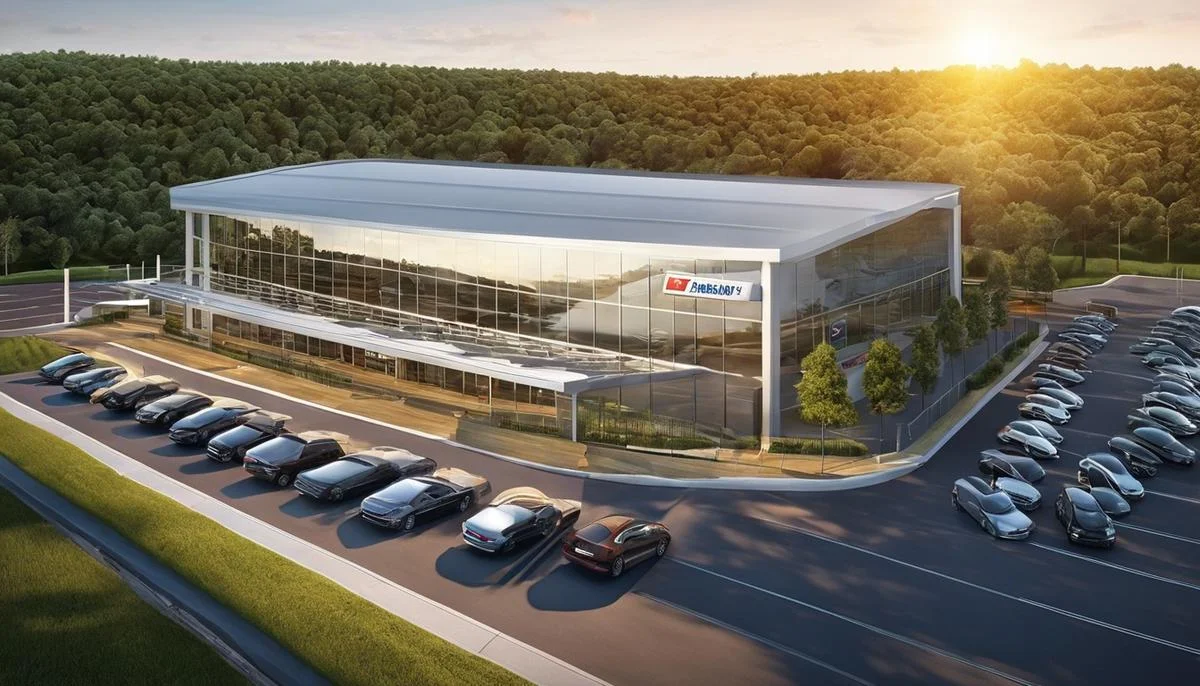
Economic Rationale
Analyzing the Financial Underpinnings of Sunday Car Dealership Closures
In an era where round-the-clock consumerism is the norm, the Sunday closure of car dealerships stands as an intriguing anachronism that begs for a deeper financial scrutiny. Let's dissect the lesser discussed economic rationale behind this weekly pause in operations and examine whether the ledger supports or contradicts the perceived fiscal wisdom of this traditional practice.
Digging into the financial bedrock of this custom, dealerships enjoy cost savings from reduced operational expenses for one-seventh of the week. This includes utilities, staffing, and overhead costs, which certainly impact the bottom line. Given the high fixed costs inherent in operating a dealership, these savings are non-negligible. However, to appraise this fully, we must shift gear and contrast these savings against the potential for lost sales.
The law of supply and demand suggests that limited availability could drive up interest. Yet, in a consumer-centric market that values the immediacy of service, one must question: Is Sunday's pause truly a missed opportunity to capitalize on weekend foot traffic? Here's where the modern buyer's journey intersects with traditional closures – shoppers have adapted by using Sundays for virtual showroom browsing, laying the groundwork for possible weekday transactions.
Respecting employee work-life balance through designated downtime may also contribute to decreased turnover and improved customer service – variables that can significantly influence profitability. Employees who value structured time off might oftentimes exhibit greater engagement and productivity during operating hours, which could very well intersect with increased sales efficacy.
As competitive forces and customer expectations evolve, the auto industry does indeed flirt with Sunday sales in certain areas, signaling a push towards a seven-day retail model. Nevertheless, the durability of tradition is reinforced by the seemingly tacit agreement among many dealerships to preserve Sunday closures. This solidarity among competitors may inadvertently foster a status quo where no single player feels obligated to break rank for fear of igniting a cost-intensive arms race for weekend dominance.
Ultimately, the question hangs: Is the financial underpinning of Sunday closures an archaic relic or a shrewd business move? Dealerships continue to operate within this established framework, thriving amidst a balance of antiquity and progression. As a vital piece in the complex puzzle of automotive sales, Sunday closures serve as a curious case study in cost-benefit analysis and strategic operational planning. The answer may not be universal, but it's clear that the viability of this practice is assessed continuously through the dual lenses of tradition and ledger lines, with a keen eye on consumer trends and expectations. Whether this practice will remain in the encroaching shadow of digital retail remains a point of speculation, but for now, Sunday continues to be a day of pause on dealership lots, a testament to the industry’s strategic financial orchestration.
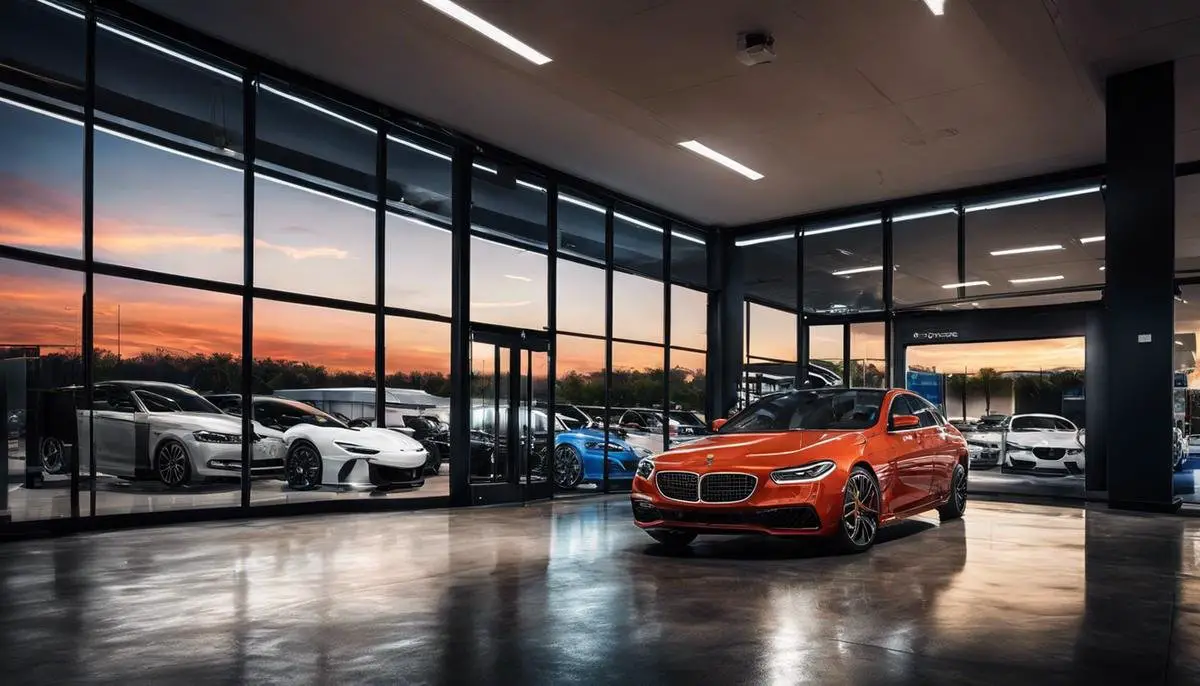
Consumer Expectations and Experience
Aligning Car Dealership Closures with Modern Consumer Expectations: A Critical Analysis
In an era marked by 24/7 connectivity and the relentless pursuit of convenience, the continuation of car dealership closures on Sundays seems to veer off-road from the trends of modern consumer behavior. Today, customers gravitate towards businesses that offer seamless, anytime-access to their products and services, setting a precedent for industries, including automotive retail, to follow suit.
Car dealerships, traditionally closed on Sundays, now stand at a crossroad, facing the pressing question: how does this practice coexist with today's customer expectations? While potential cost savings from reduced operational expenditures on Sundays provide a financial buffer for dealerships, they also juxtapose the law of supply and demand in a consumer-centric market.
The digital realm further complicates this dynamic. As consumers increasingly turn to online platforms for their shopping needs, virtual showrooms see traffic spikes on Sundays. This shift signals untapped opportunities for dealerships to streamline the car buying journey, leveraging technology to bridge the gap between physical unavailability and digital presence.
Moreover, the significance of respecting employee work-life balance cannot be overstated. Sunday closures serve as a tacit acknowledgment of the need for downtime, indirectly enhancing job satisfaction and productivity during the workweek. Yet, one must question if this benefit weighs proportionately with consumer demand for seven-day service availability.
Competitive forces churning within the industry raise a compelling argument. Dealerships adhering to traditional closure practices may find themselves at odds with non-traditional businesses ready to capitalize on the void. With startups and online-only car sellers sidestepping conventional models, traditional dealerships face a reinvent-or-risk-irrelevancy predicament.
Amid these converging trends, the financial viability of Sunday closures remains under constant evaluation. Dealerships must contend with the balancing act of operational costs and potential revenue loss due to limited operating hours. As the retail landscape evolves, so too must the strategic approach to Sunday operations.
Lastly, digital retail's inexorable rise sets the stage for a profound impact on Sunday dealership closures. E-commerce offers an opportunity for dealerships to maintain a robust Sunday presence without contravening Blue Laws. Implementing online sales platforms could bridge the gap between respecting legal and traditional retail constraints, while also catering to the modern consumer's predilection for omnipresent retail access.
In summary, as market dynamics shift and digital transformation reshapes industries, car dealerships must navigate a delicate terrain where tradition meets innovation. Aligning with modern consumer expectations could very well necessitate a reimagining of time-honored business practices, ensuring that even as showrooms may physically close, the wheels of commerce continue to turn.
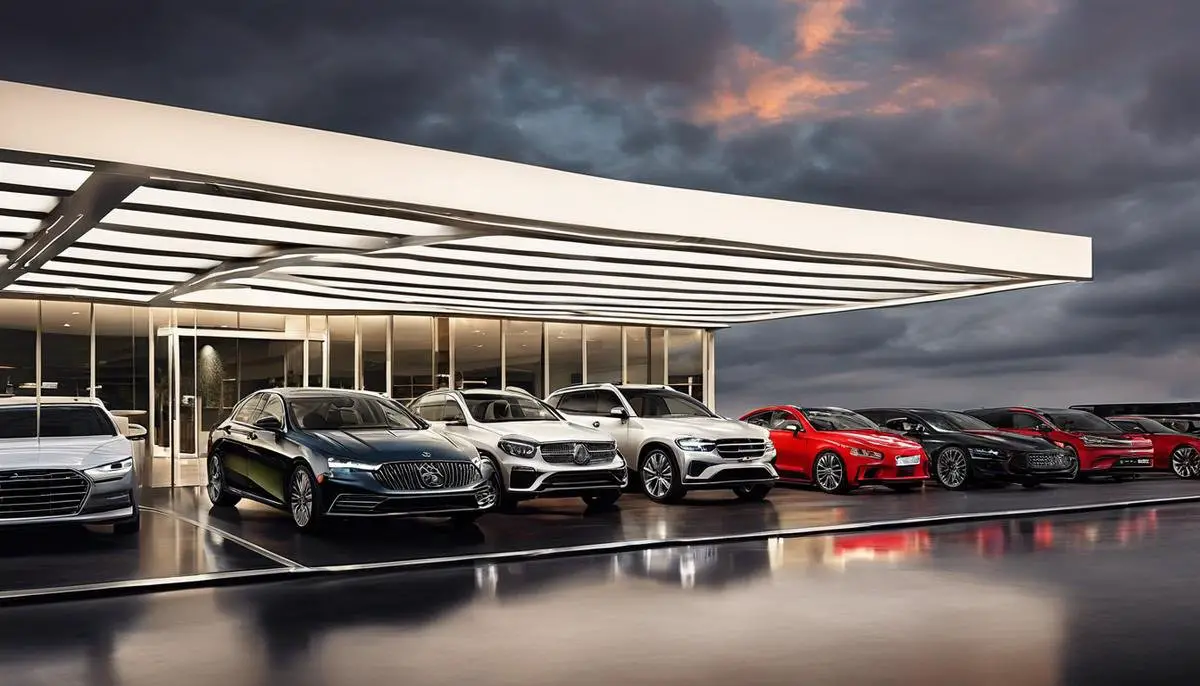
Market Disruption and Trends
Seizing Sundays: Pioneering Retail Strategies Transforming Automotive Sales
In a modern marketplace that never sleeps, the Sunday closure tradition is being redefined as progressive car dealerships adapt to emerging retail strategies. As entrepreneurs, savvy industry leaders recognize an untapped window of opportunity when faced with the inertia of regulation. Where brick-and-mortar salesrooms lay dormant, the digital landscape is bustling. Innovative dealers are increasingly leveraging advanced technologies to provide 24/7 virtual showroom experiences, thus circumventing traditional constraints without contravening them.
Augmented Reality (AR) and Virtual Reality (VR) technologies are making strides, enabling potential buyers to engage with vehicles in immersive environments from the comfort of their homes. This digital engagement transforms passive Sunday browsing into active shopping journeys, with seamless integration into customer relationship management systems to capture leads and spark sales conversations for the week ahead.
Similarly, tap-into e-commerce platforms and direct-to-consumer sales models are shifting gears in automotive retail. Recognizing a shift in consumer preference towards online purchases, dealerships are aligning with the trend, adopting digital storefronts that process transactions irrespective of the day. These platforms often include comprehensive financing tools, trade-in evaluations, and personalized customer service chatbots, ensuring that the dealer's digital doors are always open.
As automation and artificial intelligence redefine customer interactions, traditional sales strategies are calibrated with predictive analytics and data-driven marketing. By harnessing the power of big data, dealerships can target consumers when they are most attentive, including Sundays, ensuring a strategic and customized approach to every communication.
Moreover, forward-thinking dealers are reframing the Sunday closure as a strategic asset. By promoting exclusivity and urgency during the six operational days, they enhance the consumer encounter with the brand. This tactic ingeniously translates operational limitations into an enhanced buying experience.
Moreover, a rising trend that complements the non-operational Sunday is the focus on community and sustainability. Dealerships are increasingly assuming roles as local leaders, sponsoring events, and championing causes. In contrast to a day of commerce, Sundays are evolving into a day of community service, reinforcing the dealership's local image and dedication beyond profit margins.
The disruption of the Sunday closure tradition is also uncovering new avenues for staffing and operational excellence. An agile workforce model, embracing flexible schedules and remote working arrangements, aligns employee satisfaction with productivity. By investing in employee development and wellness, innovators are fostering a culture that transcends the confines of a traditional workweek, boosting morale and attracting top tier talent to their ranks.
In summation, the Sunday closure in the automotive sales industry is no longer synonymous with inactivity. The innovators at the helm are continuously rewriting the playbook, integrating cutting-edge technologies, expanding digital commerce, nurturing vital human capital, and fostering community connections. These visionaries pave the way for a future where adaptability and customer-centricity drive growth, challenging convention and reaping rewards in a landscape of ceaseless evolution.

A silent day in the bustling world of automotive sales speaks volumes about the evolving dyad of tradition and modernity. While legislation and economics have historically paved the way for tranquil Sundays at car dealerships, the crescendo of digital commerce and shifting consumer habits heralds a potential renaissance. Peering into the future, these dealerships may find themselves navigating a transformed landscape, one in which the echoes of Blue Laws meet the din of innovative market strategies. And as the car industry accelerates towards a horizon of change, it may yet redefine the very essence of weekly commerce, where the once-quiet Sundays become as vibrant and bustling as any other day in the pursuit of the American dream on wheels.
Image Source: https://writio.com/


